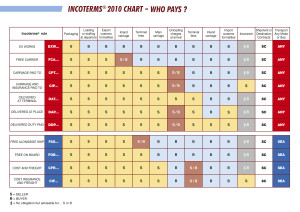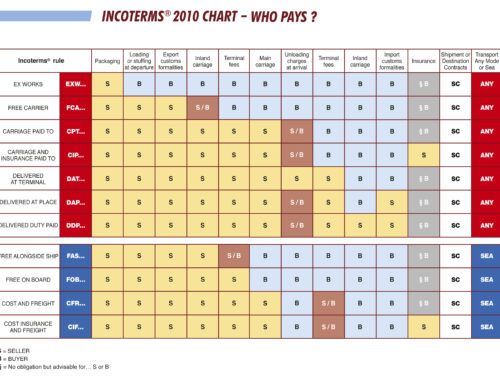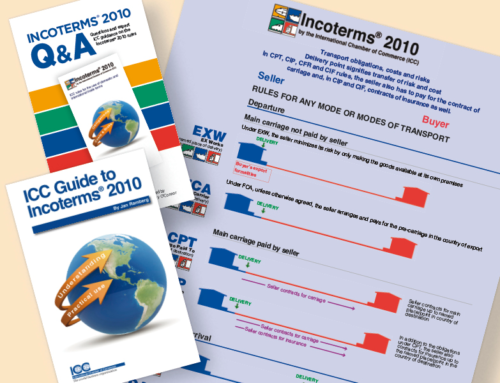










Incoterms: Who Pays What?
In our last post we learned the Incoterm definitions for Incoterms used in “any mode of transport”. In today’s post we will cover the Incoterms used for “sea/inland waterway transport only”.
Let’s take a few minutes to review what we’ve already learned. Incoterms are a set of rules, published by the International Chamber of Commerce (ICC), that define the responsibilities of sellers and buyers for the delivery of goods under sales contracts. They are widely used in commercial transactions.
Incoterms are about obligations, costs and risks:
- Obligations refer to responsibilities of the buyer and seller. Who is responsible for loading charges, inland freight, terminal charges, insurance, loading on vessel, freight, arrival charges, duty & taxes, delivery to destination and customs clearance?
- Costs must be clearly stated in the sale and purchase contracts as referenced in the selected Incoterm. Incoterms define costs specifically attributed to buyer and seller.
- Risk refers to the possibility of an occurrence which could cause loss or damage to goods. Buyers and sellers purchase insurance to safeguard against risk.
There are Seven (7) Incoterms used for any mode of transport:
- EXW = Ex Works and is followed by a named place of delivery (i.e. EXW Houston)
- FCA = Free Carrier and is followed by a named place of delivery (i.e. FCA Orlando)
- CPT = Carried Paid To and is followed by a named place of destination (i.e. CPT Atlanta)
- CIP = Carriage and Insurance Paid To and is followed by a named place of destination (i.e. CIP Chicago)
- DAT = Delivered at Terminal with a named terminal at port or place of destination
- DAP = Delivered at Place with a named place of destination
- DDP = Delivered Duty Paid and is followed by a named place of destination (i.e. DDP Austin)
Now let’s focus on the four (4) Incoterms used for “sea/inland waterway transport only”:
FAS = Free Alongside Ship and is followed by a named port of shipment (i.e. FAS Miami)
- The seller is responsible to deliver the goods to the origin port.
- The buyer bears all costs and risks of loss or damage when the goods are delivered to the origin port
Caution: As the buyer has responsibility for export clearance, it is not a practical Incoterm for U.S. exports. FAS should be used only for ocean shipments since risk and responsibility shift from seller to buyer when the goods are placed within the reach of the ship’s crane.
FOB = Free On Board and is followed by the named port of shipment (i.e. FOB Houston)
- The seller delivers the goods on board the ship and clears the goods for export. The seller pays the cost of loading the goods.
- The risk of loss of or damage to the goods is transferred to the buyer when the goods pass the ship’s rail, i.e. off the dock and placed on the ship.
CFR = Cost and Freight and is followed by a named port of destination (i.e. CFR Tokyo).
- The seller clears the goods for export and pays the cost of moving the goods to the destination. CFR requires the seller to pay the costs and freight necessary to bring the goods to the named destination, but t
- The buyer bears all risk of loss or damage to the goods, as well as any cost increases, when the goods pass the ship’s rail in the port of shipment.
Caution: Insurance is the buyer’s responsibility.
CIF = Cost, Insurance and Freight and is followed by a named port of destination (i.e. CIF Long Beach).
CIF is similar to CFR with the additional requirement that the seller purchases insurance against the risk of loss or damage to goods.
- The seller clears the goods for export and pays the costs of moving the goods to the port of destination.
- The buyer bears all risk of loss or damage to the goods, as well as any cost increases, when the goods pass the ship’s rail in the port of shipment. The seller, however, purchases the cargo insurance and is obligated to obtain insurance on minimum cover.
Caution: Insurance is important in international shipping, more than domestic US shipping, because U.S. laws generally hold a common carrier to be liable for lost or damaged goods.
Thank you for taking time out of your busy day to review Incoterm definitions with us. Remember 10 minutes a day reviewing will save your company time and money. Kindly download our Incoterms 2010 Quick Reference Guide. If you need assistance with a shipment, please feel free to request a quote or contact us.















